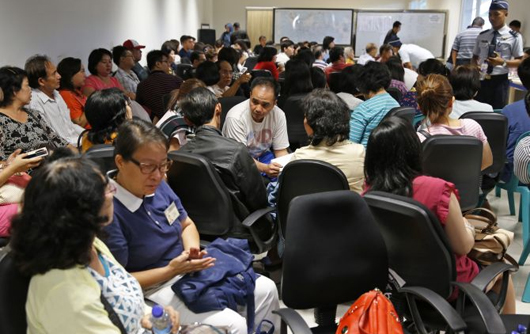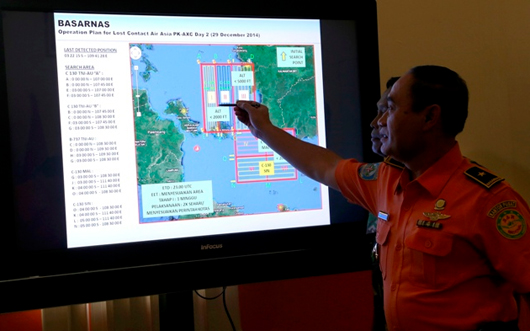
Surabaya/Indonesia, Dec 29: An Indonesian helicopter searching for the missing AirAsia jetliner saw two oily spots in the water on Monday, and an Australian search plane spotted objects elsewhere in the Java Sea, but it was too early to know whether either was connected to the aircraft and its 162 passengers and crew.
In any case, officials saw little reason to believe AirAsia Flight QZ8501 met anything but a grim fate after it disappeared from radar on Sunday morning over the Java Sea. Wary of bad weather, one of the pilots had asked to raise the plane's altitude just before it vanished, but was not allowed because another aircraft was in the way.
"Based on the coordinates that we know, the evaluation would be that any estimated crash position is in the sea, and that the hypothesis is the plane is at the bottom of the sea," Indonesia search and rescue chief Henry Bambang Soelistyo said.
The Airbus A320-200 vanished in airspace thick with storm clouds on its way from Surabaya, Indonesia, to Singapore.
Jakarta's Air Force base commander Rear Marshal Dwi Putranto said an Australian Orion aircraft had detected "suspicious" objects near Nangka island about 100 miles (160 kilometers) off central Kalimantan. That's about 700 miles (1,120 kilometers) from the location where the plane lost contact, but within Monday's greatly expanded search area.
"However, we cannot be sure whether it is part of the missing AirAsia plane," Putranto said. "We are now moving in that direction, which is in cloudy conditions."
Air Force spokesman Rear Marshal Hadi Tjahnanto told MetroTV that an Indonesian helicopter spotted two oily spots in the Java Sea east of Belitung island, much closer to where the plane lost contact than the objects viewed from the Australian plane. He said oil samples would be collected and analyzed to see if they are connected to the missing plane.
The last communication from the cockpit to air traffic control was a request by one of the pilots to increase altitude from 32,000 feet (9,754 meters) to 38,000 feet (11,582 meters) because of the rough weather. Air traffic control was not able to immediately grant the request because another plane was in the airspace, said Bambang Tjahjono, director of the state-owned company in charge of air-traffic control.
By the time clearance could be given, Flight 8501 had disappeared, Tjahjono said. The twin-engine, single-aisle plane, which never sent a distress signal, was last seen on radar four minutes after the last communication from the cockpit.
First Adm. Sigit Setiayana, the Naval Aviation Center commander at the Surabaya air force base, said 12 navy ships, five planes, three helicopters and a number of warships were taking part in the search, along with ships and planes from Singapore and Malaysia. The Australian Air Force also sent a search plane.
Many fishermen from Belitung island have joined in the search, and all vessels in that area of the sea have been alerted to be on the lookout for anything that could be linked to the plane.
The plane's disappearance and suspected crash caps an astonishingly tragic year for air travel in Southeast Asia, and Malaysia in particular. Malaysia-based AirAsia's loss comes on top of the still-unexplained disappearance of Malaysia Airlines Flight 370 in March with 239 people aboard, and the downing of Malaysia Airlines Flight 17 in July over Ukraine, which killed all 298 passengers and crew.
"Until today, we have never lost a life," AirAsia group CEO Tony Fernandes, who founded the low-cost carrier in 2001, told reporters in Jakarta airport. "But I think that any airline CEO who says he can guarantee that his airline is 100 percent safe, is not accurate."
He refused to address compensation issues or any changes that may be made to the airline as a result of this incident.
"We have carried 220 million people up to this point," he said. "Of course, there's going to be some reaction, but we are confident in our ability to fly people, and we'll continue to be strong and continue to carry people who never could fly before."
Nearly all the passengers and crew are Indonesians, who are frequent visitors to Singapore, particularly on holidays.
Flight 8501 took off on Sunday morning from Surabaya, Indonesia's second-largest city, and was about halfway to Singapore when it vanished from radar. The jet had been airborne for about 42 minutes.
Sunardi, a forecaster at Indonesia's Meteorology and Geophysics Agency, said dense storm clouds were detected up to 13,400 meters (44,000 feet) in the area at the time.
"There could have been turbulence, lightning and vertical as well as horizontal strong winds within such clouds," said Sunardi, who like many Indonesians uses only one name.
The plane had an Indonesian captain, Iryanto, who uses one name, and a French co-pilot, five cabin crew members and 155 passengers, including 16 children and one infant, the airline said in a statement. Among the passengers were three South Koreans, a Malaysian, a British national and his 2-year-old Singaporean daughter. The rest were Indonesians.
AirAsia said the captain had more than 20,000 flying hours, of which 6,100 were with AirAsia on the Airbus 320. The first officer had 2,275 flying hours.
The missing aircraft was delivered to AirAsia in October 2008, and the plane had accumulated about 23,000 flight hours during some 13,600 flights, Airbus said in a statement.
The aircraft had last undergone scheduled maintenance on November 16, according to AirAsia.
The airline has dominated budget travel in Southeast Asia for years, highlighting its low fares with the slogan, "Now everyone can fly." It completes short routes of just a few hours, connecting the region's large cities. Recently, it has tried to expand into long-distance flying through sister airline AirAsia X.
The A320 family of jets, which includes the A319 and A321, has a good safety record, with just 0.14 fatal accidents per million takeoffs, according to a safety study published by Boeing in August.







Comments
Add new comment